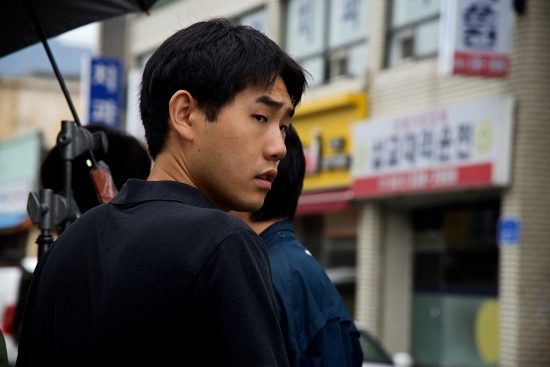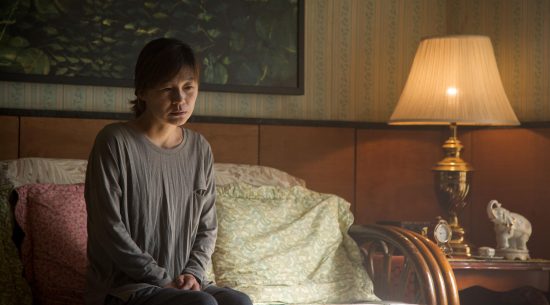Child of Cinema: Albert Shin talks about In Her Place
While his Korean immigrant parents were busy working, Albert Shin was left to his own devices to entertain himself. “I remember going to the video store when I was five or six and renting three movies at a time.” The intervention of a sibling resulted in an influential discovery. “All of my friends had seen this film Gremlins [1984], which was popular in the 1980s, so I went to the video store to rent it but then my older brother convinced me to rent a film with Jean-Claude Van Damme called Bloodsport [1988]. It’s a silly film to change someone’s life but it got me excited about what movies can do.” The aspiring filmmaker began to experiment cinematically. “I had a Hi8 camera that my parents got me when I was 15. I shot rinky-dink films doing linear editing, going from tape to tape and graduating to using an early edition of Adobe Premiere.” The passion for the big screen became a career ambition. “I grew up in the suburbs of Toronto and didn’t have a lot of friends or people who understood my love of filmmaking so York University was the first time I could meet other people like me from all over the country and the world. York is where I met my producing partner [Igor Drljaĉa]; it did an amazing job of allowing us to find and develop our voice.”
Upon graduating Albert Shin and Igor Drljaĉa established the production company TimeLapse Pictures. “Igor pushes me to take bigger risks and trust my instincts; he keeps me honest as to what I need to be doing, and how I need to be doing it. I do the same thing for Igor in the sense that he is more of an austere cerebral filmmaker which I love about his films but I try to push him so that it’s not only cerebral and intellectual. It’s a nice balance. When Igor makes his films I produce them for him and when I make my films he helps me to produce them. We get to watch each other with different hats on and that helps us as filmmakers and producers.” Point Traverse (2009) which deals with a murder in a small town marked the feature directorial debut for Shin. “The first film I directed was super micro-budget film six or seven years ago and it was before the time of DSLR cameras and people making micro-budget features. I was exploring the idea of making a film. Could I even make a feature film? Point Traverse gave me the confidence that I could step up to the plate again and give it another go.”
In Her Place which revolves around a wealthy couple making baby adoption arrangements with a poor farming family serves as the sophomore effort for Albert Shin. “The concept and the overall story stayed the same but it took a long time for me to crack the code in terms of how I wanted to tell the story and not only that, but who were these characters?” Another collaborator was recruited. “My co-writer [Pearl Ball-Harding] was instrumental as she brought a fresh perspective and a woman’s perspective that helped me figure things out. Things started falling into place. From there a huge weight had been lifted and I knew how to make it.” Shin was able to take a step back from his Korean heritage. “I wanted to make something different that cognitively brought my Canadian side to it as well as my removed Korean side. Even if I didn’t do it intentionally it would render itself in an interesting way.”
“I worked carefully with the cinematographer [Moon Myoung Hwan] to make sure that the film had a certain kind of feeling sustained throughout while subtly playing with different styles,” explains Albert Shin. “Everything had to be pre-planned to know that it would cut together with the limited amount of coverage that we were going to shoot. It was very planned out. I had the location in mind which helped in crafting of the film and how I was going to shoot it.” The weather was a big factor, especially, when it came to utilizing natural light. “There were lights enhancing things but a lot of it was planning in terms of when the sun would be coming through a certain window at a certain time.” Often times the camera peers voyeuristically through windows. “The film played a lot with perspective so it’s about being in one person’s shoes at a certain time in the film. They’re together in one place and occupying the same room in a lot of instances; however, at the same time they’re not equal or not sharing the same space in the figurative sense.”
“80 per cent of the film takes place on a farm that belongs to my aunts and uncles,” reveals Albert Shin. “At some point they abandoned the farm and it started deteriorating. Whenever I visited it I thought it would make an interesting, strong and evocative location.” The pivotal setting needed to be transformed. “The production design team [Heo Seo Hyung, Choi Young Mi] gutted the place and built it back up from scratch. It was amazing to watch them to do it. They transformed this rotting farm and turned it this beautifully rotting farm. It was interesting to watch that process happen in terms of working with them to develop a history for this place, and making sure that the production design and everything else worked with the story.” Shin notes, “We had amazing costume designers [Kim Hyun-Jong, In Ji-Ae] and we didn’t have a big budget at all so they were scrapping together whatever they could. I worked with the cinematographer to find a pallet for the film. We made sure that colour was introduced in a way where it had a point.”
“I had never made a film in Korea,” states Albert Shin. “I had no idea how they make films in Korea. I didn’t understand their film system and how it works. That meant I had to start from scratch. I didn’t know any actors. I didn’t have any contacts there and I needed actors who could bring these characters to life. There were a lot of dead ends for sure. It took six to eight months to fully lock in on the casting.” Dozens of people were auditioned for the different parts which eventually went to Yoon Da Kyung, Ahn Ji Hye, Kil Hae Yeon, Kim Sung Cheol, Kim Chang Hwan, and Kim Kyung Ik. “I feel lucky with the ones I was able to eventually cast.” Shin observes, “I’m not one of those directors who wants the actors to dot every ‘i’ and cross every ‘t’ in the script. We take the scene that’s written, break it down and build it back up again using a lot of improvisation to make it more natural and real. I let the actors play and we started to find their voices. They were instrumental in making that happen for sure. They brought so much of themselves to the roles. It would have been a different looking film if I had cast different people.”
“What we shot was pretty much the film we ended up making,” remarks Albert Shin. “A lot of stuff was cut out for the sake of time and I wanted to make a film with a certain amount of pace to it. One of the more satisfying things about editing the film was because we had a small budget I was able to design a film where there wasn’t a lot of outside external forces telling me what to do. I don’t know how many more times that I’ll ever be able to do this in my career but I was able to make the film I wanted to make, and to be able to live and die by that. Watching it coming slowly to life was extremely satisfying.” The drama features 40 minutes of musical score. “It’s subtle and woven into the sound design which was part of the idea. I didn’t want to beat people over the head with music because music done a certain way can be manipulative in terms of the emotion of the scene. I wanted to steer clear of that and let the music subtly enhance things because the film is trying to be subtle with most things. Our composer [Alexandre Klinke] is based out of Vancouver and he was amazing in terms of weaving in tradition elements like a guitar but also using a lot of electronics and amalgamating the two.”
Shooting in Korea was not as daunting as Albert Shin expected. “People got on board and trusted me; it made for a communal experience. It was a great collaboration that was unique and rewarding.” In Her Place had its World Premiere at the 39th Toronto International Film Festival. “Before our premiere we were able to get a Canadian distributor which is amazing. A71 Entertainment is an up and coming distributor that takes a lot of risks and picks up some adventurous titles. I’m excited about that. We have a great sales agent Elle Driver and they believe in the film and have been supportive in getting the film out to film festivals and trying to make it so the film has a chance. It’s the kind of film that has to be nurtured and worked on to get the word out and to let people know that it’s out there.” The reaction from Korea has been rewarding. “It’s nice that the Korean Film Council is embracing the film and including In Her Place as part of the films they are going to promote which is wonderful since this is film that is half Canadian and half Korean in an interesting way.”
The Korean film industry is vibrant. “It has grown a lot in the last 10 to 15 years,” notes Albert Shin. “It used to be not great but they have step up their game in the last few years. A lot of world renowned filmmaking auteurs have come out of Korea making interesting and bold movies. In the grand scheme of world cinema it is still a young film industry so hopefully it has a lot more interesting places it can go and maybe I can get on that coattail and go along for the ride.” The enthusiasm sparked by watching Bloodsport has not waned. “I hope to be doing this for a long time and the only way to keep myself going is to jump genres. I don’t want to be making austere dramas for the rest of my life so I have ambitions of making killer action films and hilarious comedies. I’d like to try all of those things, like a period piece. I have all of this ambitious stuff that I don’t know if it will ever happen but I feel if I ever get a chance to make an action film I would try everything I could to make sure it kicks ass.” Shin adds, “Getting in the Toronto International Film Festival, and me being a local Toronto filmmaker, is a dream come true. I don’t want the film to die after the festival. My hope is that it can have a life afterwards. I’m hoping that people checkout the film and respond to it.”
Trevor Hogg is a freelance video editor and writer who currently resides in Canada; he can be found at LinkedIn.











